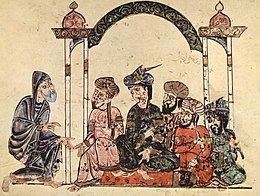
Back قصيدة Arabic قصيده ARZ Qəsidə Azerbaijani قصیده AZB কাসিদা Bengali/Bangla Kasida BS Cassida Catalan قەسیدە CKB Kasída Czech Qasīda German
This article has multiple issues. Please help improve it or discuss these issues on the talk page. (Learn how and when to remove these template messages)
|
| Part of a series on |
| Arabic culture |
|---|
 |
The qaṣīda (also spelled qaṣīdah; plural qaṣā’id) is an ancient Arabic word and form of poetry, often translated as ode, passed to other cultures after the Arab Muslim expansion.
The word qasidah is originally an Arabic word (قصيدة, plural qaṣā’id, قصائد), and is still used throughout the Arabic-speaking world; it was borrowed into some other languages such as Persian: قصیده (alongside چكامه, chakameh), and Turkish: kaside.
The classic form of qasida maintains both monometer, a single elaborate meter throughout the poem, and monorhyme, where every line rhymes on the same sound[1] It typically runs from fifteen to eighty lines, and sometimes more than a hundred.[1] The genre originates in Arabic poetry and was adopted by Persian poets, where it developed to be sometimes longer than a hundred lines.
Well-known examples of this genre include the Mu'allaqat (a collection of pre-Islamic poems written by a variety of authors, most famously including Imru' al-Qays), the Qasida Burda (Poem of the Mantle) by Imam al-Busiri, and Ibn Arabi's classic collection Tarjumān al-Ashwāq (The Interpreter of Desires).